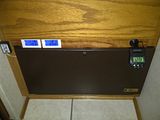bshpilot wrote:
NinerBikes wrote:
Being in AZ, 115f and the possible head temps at the compressor at start up, using a 20 amp jack is feasible, but every time that AC starts up, it's a potential problem, as the compressor probably has a locked rotor amperage draw of 60+ amps.
Possible, yes. Good for MIL's electrical or you electrical, no, not at all. Keep an eye on the connector and cord temperatures, go out and check them at A?C compressor start up, before you burn something down. Huge current surge at start up, every single time.
I monitor my consumption very closely - and my plugs have never shown any sign of warmth.
Even in houston weather (w/ a clamp-meter) I've never seen the start up consumption anywhere close to the 50a or 60a you speak of
if i was connected to a marginal outlet (below 115v & incapable of 20a) i wouldnt be concerned - but like i said I've monitor & tested my consumption very close & never seen the peaks you claim.
Read my statement again... but a little more carefully this time...
"Dammit how many times is it going to take to impress the fact that an AC restating on high head can draw FIFTY AMPERES? Yes it is for a short time. Just long enough for a loose or corroded contact in the plug or receptacle to glow red hot."
The paragraph contains information. What information in that paragraph may differ from how your AC operates on your plug? The words CAN. LOOSE. CORRODED are three clues.
An inductive load is reactive. If the voltage drops at a connection that is taxed NEAR TO it's capacity, amperage is going to rise dramatically. Ever see what happens in a REACTIVE situation where a slightly bad connection goes from warm to flames in 5 seconds?
It takes a very good connection meaning in very good condition to withstand a high head restart. You are fortunate enough to have been connected with a very good connection.
And yes I have seen several high head restarts that consumed 50+ amperes. My usual response:
Shut it down! There is a bad connection somewhere.
You have to deal with reality on this not pick and choose specifications and data. I know of few RV'ers who shut off all the lights and other 12 volt loads to pamper the AC. It all adds up.
Add the minor loads to a high head re-start and the recommendation for a 20-amp connection should read: The receptacle and plug MUST be in perfect condition...
The recommendation should not read "Oh yeah, it's OK. plugger in and go for it."
Unless of course a person does not care about receptacle and plug fires, losing power in the middle of the night and all the other benefits that come with being reasonably careful.
I recommend research. Research the subject of actual data of what happens to current demands when voltage drops. You need either a recording peak ammeter, or an analog quality ammeter and shunt to respond fast enough to see the current surge. I was not exaggerating when I claimed the reactive V sag and I surge can flame an outlet contact in seconds. It's scary.
And to the OP: YES YES YES! Please get a hard start kit installed IMHO.
